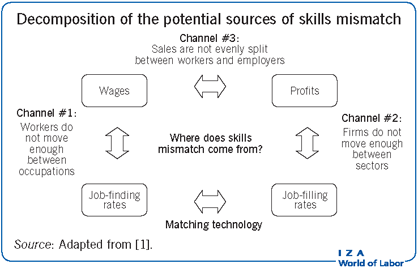Elevator pitch
Evidence suggests that productivity would be much higher and unemployment much lower if the supply of and demand for skills were better matched. As a result, skills mismatch between workers (supply) and jobs (demand) commands the ongoing attention of policymakers in many countries. Policies intended to address the persistence of skills mismatch focus on the supply side of the issue by emphasizing worker education and training. However, the role of the demand side, that is, employers’ wage-setting practices, garners comparatively little policy attention.
Key findings
Pros
Analysis shows that 4% of workers are under-skilled, and 10% are over-skilled for their jobs.
Mismatch is an important determinant of productivity and wages.
The harmful effect on wages of being mismatched early in one’s career is large and persistent.
Joblessness in an economic downturn would affect one-third fewer people if the mismatch problem were resolved.
Cons
Though reliable estimates show that skills mismatch lowers individual workers’ productivity, effects on aggregate productivity remain largely speculative.
Estimates of the effect of skills mismatch on unemployment suffer from serious measurement issues.
Recent literature indicates that focusing on education and training to boost worker skills may be misguided; rather, firms’ actions (e.g. adjusting wages to reflect relative skill shortages) may be a key determinant of skill mismatch.
US evidence shows that geographic mismatch has a negligible effect on productivity and unemployment.
